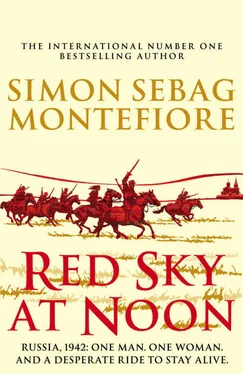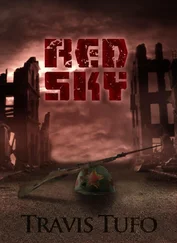‘We’ll get him back, nurse,’ he said. ‘I saw him just after he went down, hit right in the chest.’
‘You were there, consul?’ she asked.
He nodded. Her husband’s death seemed surreal; she expected Ippolito to stride into this garden at any moment, with his Clark Gable moustache, and gleaming boots, dyed black hair, utterly immaculate as ever. She had loved him, she supposed, even with his faults – and what would become of her now? She blinked back her tears, priding herself on her control. She had cried before and she would again, but not now.
‘You said, consul, that the Russians had been defeated and yet they drove us out of that village in a few minutes.’
She knew that Malamore blamed her husband for the incompetent Italian response but instead he replied, ‘That’s war. But that Bolshevik cavalry was annihilated yesterday.’
‘That’s reassuring,’ she said, looking into those features gouged into a mask by the glare after years of fighting in Abyssinia, Spain, Greece and this second summer in Russia. There were, she thought, not many Italians like Malamore. Even though he wore Blackshirt uniform – the black fez with tassel, the black blouse with scarlet flames and fasces, the symbols of the Fascist Party – it was impossible to embellish this harsh man who, she thought, belonged to another time, a condottiere of the Renaissance perhaps, and whose eyes were like the slits of a castle in the sun. ‘Then victory will be ours?’
‘Our German allies are just finishing off Ivan’s last bridgeheads on the Don. Then we push for the Volga and Stalingrad. Ivan will collapse. Victory.’
‘ E poi… console? Then what?’
There was a long silence punctuated by the hiss of the cigarette and the gravelling of his breathing. Between the cottages she could see his Kalmyk scouts holding his stallion Borgia and their horses. Then Malamore’s hand was on her bare arm: ‘Malamore is here for you.’ Using the third person, she noted.
‘Thank you, consul.’
‘Not consul. Call me Cesare.’
As Malamore stood with his hand on her amber-skinned arm, the boys in the house (unaware that the dread consul was present) started singing again, achieving an operatic crescendo of Italian passion that made Fabiana want to have hysterics.
‘What is this unit, an opera?’ he muttered. He took her hand, kissed it abruptly, and replaced his fez; and she watched him mount Borgia and ride out with the SS officer and the Kalmyk scouts.
Looking back, he raised a hand to his fez, and was gone.
Every few minutes, Benya heard another crackle of gunshots. Then quiet. Then a few more gunshots. He knew by now what story this morbid rhythm told.
He and his fellow partisans had taken up positions on either side of the lane that led between Mandryka’s headquarters in Shepilovka and the scene of his latest murderous aktion . First, they had dealt with the Romanians. It had been easy; they were drunk. Now they were closer to Novi Petroshevo where Mandryka and his men were.
Benya and the others left the horses behind, hobbled and waiting, then crawled through the grass until they could see some of what was happening through their binoculars. Large pits had been dug amongst the trees. Under the orange sun, naked civilians stood together, guarded by Mandryka’s Schuma, who were wearing German tunics marked with the nationalist insignia of the cross of St George. Benya noticed that the naked adults assumed that wincing pose of shyness, hands covering themselves, assumed by people in ordinary life when they were in a changing room at the swimming pool or waiting for a doctor – but now, amidst this barbarity, its gentility broke his heart.
‘Recognize any of your former friends?’ asked Elmor, who was lying next to Benya.
‘At least five defectors from the Shtrafbat,’ whispered Benya, amazed to see the traitors Delibash, Ogloblin and Tufty Grishchuk in German uniforms. And there were Germans there too, some with SD on the sleeves, some in police uniforms. As Benya and the partisans watched, Mandryka’s men selected another ten people – including women and children – walked them to the edge of the pits and then the shots rang out.
Three officers in German uniforms rode over on horseback to watch.
‘That’s Dirlewanger,’ said Elmor, pointing at a stick-thin German officer with lightning runes on his tunic. ‘In the 1920s he was convicted of murder and rape, but when the Nazis came to power, he put together his own gang of cutthroats, the Poachers’ Battalion. These Germans are soldiers in his Sonderkommando . He’s said to burn people in barns.’
‘Who’s beside him? With the knout?’ asked Zhurko.
‘That’s Mandryka himself,’ said Elmor. Benya saw a small, red-faced man in German-style uniform, swishing a thick leather whip in his hand.
Dr Kapto rode right beside Mandryka. Wearing a German tunic with Russian markings, he was carrying on his saddle the girl, just like before. Benya remembered her wide moonlike eyes, but this time she seemed to be almost lost in a trance in a desolate land beyond hysteria.
‘He was our doctor till two nights ago,’ Benya said.
‘Lyovka,’ Elmor asked the man on his right, a spy who had managed to spend some time amongst Mandryka’s men. ‘Why is Kapto trusted by Mandryka?’
‘His arrival was a big surprise,’ Lyovka reported. ‘He was greeted with honour and some amazement. Mandryka calls him his “best friend”!’
‘And the child?’
‘He rides everywhere with that little girl, even eats with her next to him.’
‘He arrived with a nurse?’ asked Zhurko.
‘Tonya. She’s taken to life with Mandryka’s men. She carries a gun and she uses it.’
Another group of civilians lay down in the pit. The shots rang out. Can there be so much sadness in this world? he thought. Isn’t there a measure to decree that this is enough?
‘Can we stop this?’ asked Benya.
‘Not yet,’ Elmor replied.
‘We can’t just do nothing!’
‘Go back to the horses,’ ordered Zhurko. ‘If we fight and die now, we don’t help anyone. Obey your orders, Golden.’
Benya felt Elmor’s wintery glance, sensing he wouldn’t hesitate to execute an insubordinate Shtrafnik.
Benya crawled back to the horses and he stroked Silver Socks and wept for what he had seen and heard. Over and over again, he could hear the volley of shots, then silence, then the scattered shots again. He covered his ears, longing for this to be over but inside he was raging. He longed to kill Mandryka himself – and Kapto.
His mind was whirring. Kapto had been a special case even in Kolyma. He had not been shaven like the rest of the prisoners – hence his head of kinky-curled hair – and he received the best rations; no doubt the ‘Baby Doctor’ looked after the Commandant’s family as well as the illegitimate children of the guards. Benya remembered their final evening before they were thrown into the fighting, when Kapto had been called to see Melishko. ‘Bunions and piles,’ the men had joked but if it was just about the colonel’s ailments, why was there a general there as well? And why did Kapto return with a new uniform? Benya recalled the Willys jeep parked outside the headquarters, and also that Melishko was receiving orders at the time. If the telegraph was faulty, he thought, the jeep might have brought the orders. All coincidence? Benya sighed. The Baby Doctor had deceived everyone, winning trust in the Camps so that he managed to get to the front. But what were the chances of him getting to a sector where Mandryka was serving? Such things could happen, he supposed. War was a river in flood that washed everything downstream in the foam of its unpredictable rapids, throwing together unthinkable events and implausible people.
Читать дальше












